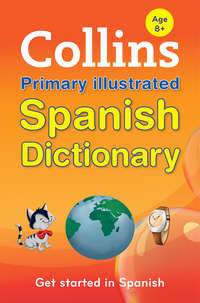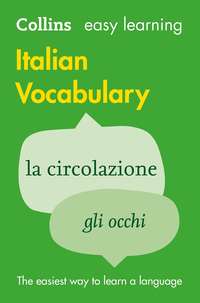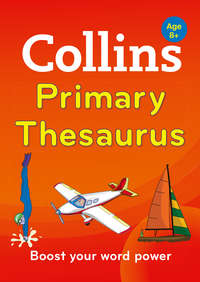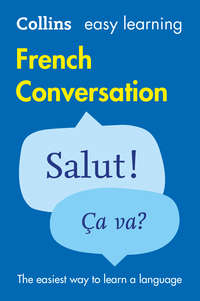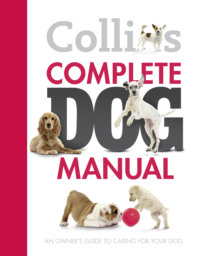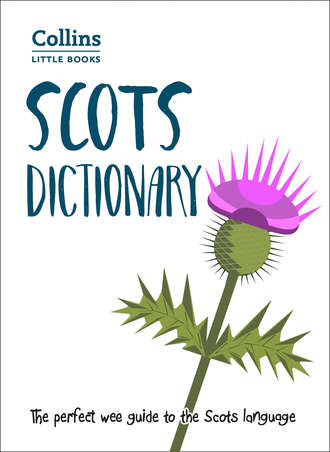
Полная версия
Scots Dictionary: The perfect wee guide to the Scots language
after If someone says they are just after doing something, they mean that they have just finished doing it: Wipe your feet. I’m just after cleaning the floor.
agent An agent is a solicitor acting on a person’s behalf, especially in a court hearing: the defence agent.
ages Someone who is ages with someone else is the same age as that person: My James is ages wi her David.
agley (a-glay or a-gliy) or aglee (a-glee) Agley means squint or askew. If something goes agley it doesn’t happen or work out in the way that was intended or hoped for: Their schemes had gone irreparably agley. [The word comes from the earlier gley squint, which comes from Middle English]
Ah Ah is a Scots word meaning I: Ah said Ah hadnae seen him.
ahint (a-hint) or ahent (a-hent) Ahint means behind or at the back: Hing yer coat up ahint the door.
aiblins (abe-lins) Aiblins is an old-fashioned or literary word meaning perhaps or possibly: We’d had a few pints – aiblins a guid few.
ain (rhymes with rain) Ain means own: I’m going on my ain; He can wash his ain claes.
aince (eenss) Aince is a Northeastern word meaning once.
airt An airt is a direction or point of the compass. From a’ the airts means from all over the place.
Alba (al-a-pah) Alba is the Gaelic name for Scotland. A number of motorists in Scotland, even non-Gaelic speaking ones, have Alba on the nationality plates on their cars.
aliment In Scots Law, aliment is maintenance or support claimed by one person from another, especially money paid by one spouse to another when a couple is separated but not divorced.
Andrew, St
Andrew, St St Andrew is the patron saint of Scotland. He was one of the twelve apostles of Jesus, and the brother of Peter. His feast day is on November 30th.
ane In some parts of Scotland, ane means one: A guid New Year tae ane and a’!
anent (a-nent) Anent means about or considering: a few remarks anent the meeting.
Angus (ang-giss) Angus is a historic county in the northeast of Central Scotland, the southern boundary of which is the Firth of Tay and the eastern the North Sea. It is now the name of a council area occupying much the same area as the old county.
Arabs The supporters of Dundee United football team are nicknamed the Arabs. [The origin of the nickname is unclear, but it may have started as a jocular reference to the one-time sandy condition of the Tannadice pitch]
Arbroath The Declaration of Arbroath was a letter sent by the Scots nobles to the Pope in 1320, asserting Scottish independence.
Arbroath smokie An Arbroath smokie is a small haddock that has been cured by being salted and then smoked unsplit over a fire. [The name refers to Arbroath, a port in East Scotland in Angus, where this method of curing originated]
Argyll (ar-guile) Argyll is an area and historic county of Western Scotland, consisting of the parts of the mainland west of the Firth of Clyde as far north as Glencoe, and the islands off this area. Most of the historic county is now included in the Argyll and Bute council area.
Arranite An Arranite is a person from Arran, an island off the southwest coast of Scotland, in the Firth of Clyde.
arrestment In Scots Law, arrestment is the seizure of someone’s wages, bank account, social security payment, etc., until a debt due to the person or organization who started the legal action leading to the arrestment has been paid: The club appointed a liquidator after the chairman was served with an arrestment order.
as As is a word meaning than: mair as yin.
ashet (ash-it) An ashet is a large plate or shallow dish, usually oval in shape, used for cooking or serving food. [The word comes from the French assiette meaning plate]
ask for To ask for someone is to make enquiries about their well-being or health: Tell your Dad I was asking for him.
Atholl brose or Athole brose Atholl brose is a drink or a pudding made from whisky, honey, oatmeal, and water. Double cream is sometimes added. [The drink is named after an Earl of Atholl who, according to legend, incapacitated one of his enemies by spiking his well with whisky and honey]
at it To be at it means to be up to no good: There is a general belief that all politicians are at it and not to be trusted.
atween (a-tween) The word atween means between: a sausage in atween two dauds o’ breid.
aucht (awCHt) or echt (eCHt) Aucht is a Scots word meaning eight.
aucht-day An aucht-day person or thing is an ordinary or unremarkable one: a Northeastern term: jist an aucht-day kinna body. [The word comes from the earlier Scots way of referring to a week as aucht days (counting inclusively from Sunday to Sunday and so on)]
auld (rhymes with bald) Auld means old.
Auld Alliance The Auld Alliance refers to the historical links between Scotland and France. These links started in the 14th century when both nations were the subject of English ambition and endured until the Reformation ranged the two countries on different sides of the Protestant-Catholic divide. During this period France had a detectable influence on the development of Scottish institutions and law as well as customs and manners.
Auld Enemy
Auld Enemy In Scotland, the English are sometimes referred to as the Auld Enemy, especially now in a sporting context: The worst Scots nightmare, a gubbing by the Auld Enemy, was realized. [This phrase refers to the long history of conflict between the two countries]
Auld Reekie Auld Reekie is a nickname for Edinburgh. [The name means literally Old Smoky]
ava (a-vaw) Ava is a word meaning at all: It’s no for the common fowk ava.
avizandum (av-viz-zan-dum) Avizandum is the legal term for a judge’s or court’s private consideration of a case before giving judgment. A judge or court makes avizandum when time is needed to consider an argument or submission. [The word comes from the Medieval Latin avizāre to consider]
aw A variant of a’.
awa (a-waw) Awa means away.
away To be away to a place means to go there: I’m away to my work. Away! is used to indicate disbelief or surprise. Away wi ye! is used to indicate contempt for a person or dismissal of what they have said. Someone who is away wi it is very drunk. Away and … is used in many expressions of dismissal: Away and chase yourself!; Away and bile yer heid!
awfy (aw-fi) or awfu (aw-fa) Awfy means awful: Ah feel awfy. Awfy also means very: He’s awfy untidy.
aye or ay 1 (eye) Aye means yes: Aye, I’ll be there. 2 (iy) Aye means always or constantly: He’s aye complaining.
ayeways (iy-ways) Ayeways means always: He’s ayeways got a few cans put by; Ye can ayeways try again later.
Ayrshire (air-sher or air-shire) Ayrshire is a historic county in Southwest Scotland, on the east coast of the Firth of Clyde. It is now administered by three council areas: North Ayrshire, South Ayrshire, and East Ayrshire.
B
ba or baw (baw) A ba is a ball.
babby A babby is a slightly old-fashioned word for a baby.
bachle (baCH-l) A variant of bauchle.
back court or back green The back court of a tenement building is the shared paved or grassy area behind it.
backie 1 In Dundee, Aberdeen, and elsewhere in the Northeast, a backie is the back court of a block of flats: All the young guys played football, on the backies and on the green. 2 A backie is also one of the many local terms for a piggy-back, which is also known as a carry-code, a coalie backie, or a cuddyback in different parts of Scotland.
back of The back of an hour is the time just after it, up until about twenty past: I’ll meet you at the back of eight.
baffie (baf-fi) Baffies are slippers.
baggie or baggie minnie A baggie is a minnow, especially a large one.
bagpipes The bagpipes, often called the pipes for short, are a musical instrument consisting of a set of pipes through which air is blown from a bag held under the player’s arm. An individual instrument is known as a set of bagpipes. The type most commonly seen in Scotland, the Highland bagpipes, has one pipe with holes in it, known as a chanter, which is used to play the melody, and three pipes tuned to a fixed note, which are known as drones. The bag is filled by the player blowing into it. There also exists a smaller instrument, the Lowland bagpipes, which is sweeter toned and has the bag filled by a bellows which the player squeezes between his or her arm and side. The small Irish uillean pipes are also encountered, mainly among folk musicians.
ba’ hair
ba’ hair (baw hair) A ba’ hair is a rather indelicate term for a very small, almost imperceptible distance; a whisker: That just missed ma heid by a ba’ hair! [It literally means a male pubic hair]
bahookie (ba-hook-ee) A Glasgow variant of behouchie.
bailie or baillie (bay-li) Bailie is an honorary title given to senior local councillors in some areas. It now has no legal significance, although formerly bailies had some of the powers of a magistrate. [The word comes from the Old French baillif a bailiff]
bairn In much of Scotland, a baby or young child is known as a bairn. In West Central Scotland, the term wean is used instead: The wife’s expecting a bairn; The bairns came home from the school. A person from Falkirk is sometimes referred to as a Falkirk Bairn, and Falkirk football team is nicknamed the Bairns. [This use of the word is an allusion to Falkirk’s town motto, “Better meddle wi the deil than the bairns o Falkirk”]
baith (rhymes with faith) Baith means both.
baldie A variant spelling of bauldie.
balloon A balloon is a Glasgow term for someone who is full of hot air and whose opinions, although loudly and frequently expressed, are regarded as worthless: A pompous balloon who drivelled on about “deliverables” and “blue-sky thinking”.
ballop (rhymes with gallop) In some areas, such as Galloway, the fly on a pair of trousers is known as the ballop: I suppose we’d better tell him his ballop’s open. Also called (elsewhere) spaiver.
balmoral (bahl-maw-rul) A balmoral is a type of round brimless cap, the top of which projects beyond the side and has a bobble on it. It often has a checked band round the side, and is usually worn at a slant. [It is named after Balmoral Castle, a private residence of the British royal family in Aberdeenshire]
bampot (bam-pot) A bampot is a colloquial term for a foolish, stupid, or crazy person, as are bam and bamstick. [These terms all probably come from barm, the froth on the top of a fermenting liquid, which is also the source of the English word barmy meaning crazy]
bandit In the Glasgow area, any thing, person, or event that causes pain or outrage may be referred to as a bandit, especially in exclamations such as ya bandit!
Banff Banff or Banffshire is a historic county of Northeast Scotland, consisting of part of the southern coast of the Moray Firth and the area inland from it. It is now part of the Aberdeenshire council area.
banjo (ban-joe) To banjo someone is a Glaswegian term meaning to hit them a single hard blow.
bannock (ban-nok) A bannock is a round flat unsweetened cake which is made from oats or barley and baked on a griddle. Bannock is also short for Selkirk bannock, a type of round fruit loaf originating in the Border town of Selkirk.
Bannockburn (ban-nok-burn) References to Bannockburn are generally to the battle which took place near Stirling in 1314, at which the Scottish army led by Robert the Bruce defeated an invading English army and secured Scotland’s position as an independent nation until 1707. The present-day village of Bannockburn is situated a few miles further down the Bannock Burn.
barkit (bark-it) Barkit is a word used in the Northeast which means very dirty, used particularly of something which is encrusted with dried-on dirt.
barley
barley Barley is a cry used, chiefly in the East of Scotland, to call for a period of truce or a temporary halt to a game among children at play, used, for instance, when someone is hurt or needs to tie their shoelaces. In Western Scotland, the word used is usually keys. [The word is probably derived from parley, a ceasefire for discussion]
barley bree See bree.
baronial (ba-roe-ni-al) The baronial style of architecture is one popular in the 19th century in which buildings are ornamented with pseudo-medieval features such as turrets and mock battlements: The magnificent turreted Scottish baronial style of the exterior of the hotel.
barra (ba-ra) A barra is a wheelbarrow. Something which is right into one’s barra is ideal and exactly in line with one’s interests or desires. To fancy one’s barra is to have an unduly high opinion of oneself. In the Glasgow area, a wee barra is an informal way of referring to any small person that the speaker likes, or at least does not dislike. The Glasgow flea market is known as The Barras.
barrie or barry (bar-ri) Something which is barrie is very good or very attractive: Your hair looks really barrie like that; We’d a really barrie time. [The word, which is of Romany origin, is mainly used in Edinburgh and the Southeast]
bashit Bashit vegetables are ones which have been mashed: bashit neeps.
bastartin (bass-ter-tin) or bastardin (bass-ter-din) Bastartin is a swear word used, like damned or bloody, to indicate dislike or annoyance: Watch whit yir daein wi that bastartin hammer!
bate (bait) Bate is a Scots form of beat or beaten: We got bate wan nil.
bauchle (bawCH-l) or bachle (baCH-l) A bauchle was originally a shabby or worn-out shoe. Nowadays the word bauchle is usually used to describe an ungainly or shabby-looking person, especially a small one: a wee bauchle.
bauldie or baldie (bawl-di) Someone who is bauldie or bauldie-heidit is bald: a wee bauldie guy. A bauldie is a bald person. A bauldie is also a very short haircut: You wouldn’t notice I’d had my hair done even if I got a right bauldie, would you?
bawbag (baw-bag) The bawbag is a colloquial term for the scrotum. In the Glasgow area, bawbag is also used as an insult to a person.
bawbee (baw-bee) A bawbee was originally a silver coin worth six Scots pennies. Later, bawbee came to mean a halfpenny. Although the halfpenny no longer exists, the word bawbee is still used to mean any small amount of money, especially in phrases implying miserliness or shortage of money: the current economic climate – otherwise known as a serious lack of bawbees. [The coin was probably named after Alexander Orrok of Sillebawby, who became master of the Scottish mint in 1538]
bawface A bawface is a round, chubby face, or a person with such a face.
bawheid (baw-heed) Bawheid basically means the same as bawface. However, it can also be used as a cheeky form of address for a person: Hey, bawheid!
beadle A beadle, also known as a kirk officer or church officer, is a paid official of the Church of Scotland, whose job includes assisting a minister with administrative work and placing the Bible in the pulpit at the start of a service.
beamer A beamer is a red face caused by embarrassment or guilt, or something which is so embarrassing or bad that it causes such a blush. The word is mainly used in the Glasgow area.
bear A bear is a usually derogatory term for a wild and uncouth young man, particularly one who drinks a lot: The bar closed long before the bears’ drooth was assuaged.
beast Among farmers, a beast is a calf, cow, bull, or bullock, irrespective of its age or sex. The plural can be either beasts or beas.
beastie
beastie A beastie is any small animal, nowadays particularly an insect, spider, or similar creepy-crawly.
beauty Ya beauty! is an exclamation of delighted approval or agreement: A holiday on Monday. Ya beauty!
beds or beddies In some areas of Scotland, the game of hopscotch is known as beds. The pattern of squares chalked on the ground on which the game is played is known as a bed. Also called pauldies and peever.
beel To beel is a Northeastern word which means to fester or turn septic.
beelin To be beelin is to be furiously angry. Beelin is less commonly used to mean very drunk. A beelin is a Northeastern name for a boil on the body. [All these senses are derived from beel (see above)]
beezer Something which is a beezer is an extreme example of its kind, usually one which is bigger or better than normal. In particular, a cold but dry and sunny winter day is often referred to as a beezer.
behouchie (ba-hooCH-ee) or bahookie (ba-hook-ee) The behouchie is an informal, usually jocular, name for the backside: Sit on your behouchie, you! [It is probably a combination of behind and hough, the Scots word for a thigh]
bell The Bells is the name traditionally given to the moment at midnight on December 31st when church bells are rung to mark the beginning of the New Year: We always used to go to the Cross for the Bells, but it’s got a bit rowdy these days. When a group of people are drinking in a bar, the person whose turn it is to go and buy the next round of drinks is often said to be on the bell.
belong to To belong to a town or area is to live there: I belong to Glasgow. In Scotland, people sometimes say that the owner of an object belongs to that object, rather than the object belonging to the person: Who belongs to this coat?
belt The belt, also known as the tawse, was a leather strap with which schoolchildren were struck on the hand for punishment. Its use is now illegal: I got six of the belt for fighting. To belt a child was to punish them by hitting them on the hand with such a strap.
Beltane (bell-tane) Beltane is an old Celtic fire festival which originally took place on the first or third of May. It was also a former term day, again on the first or third of May. In Peebles, Beltane is also the name given to the festivities accompanying the Riding of the Marches, which are held in late June. [The word comes from the Gaelic belltainn]
beltie (bell-ti) A beltie is an informal name for the belted Galloway, a variety of Galloway cattle which is black at the front and rear but has a white band round its middle. They are most common in Galloway in the extreme Southwest of Scotland, where they were first bred.
ben 1 A ben is a mountain. Ben is often used as part of the name of a mountain, such as Ben Nevis or Ben Lomond. [In this sense the word comes from Gaelic, where it is spelt beinn] 2 Ben also means in, within, or into the inner or main part of a house or other building: Come ben the hoose; She was ben the kitchen making tea. A ben is also the inner or main room of a house, especially that of the old-fashioned two-room cottage known as the but-and-ben.




